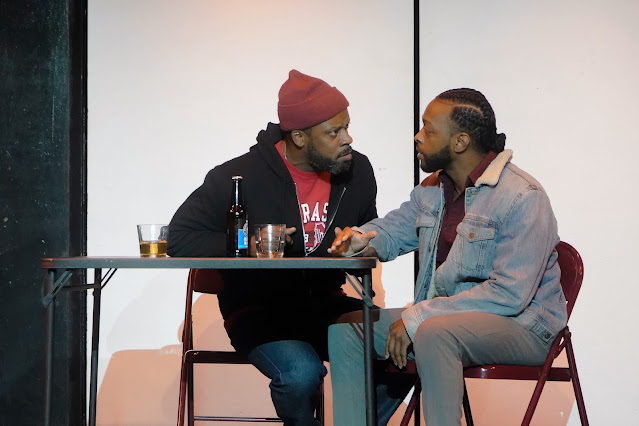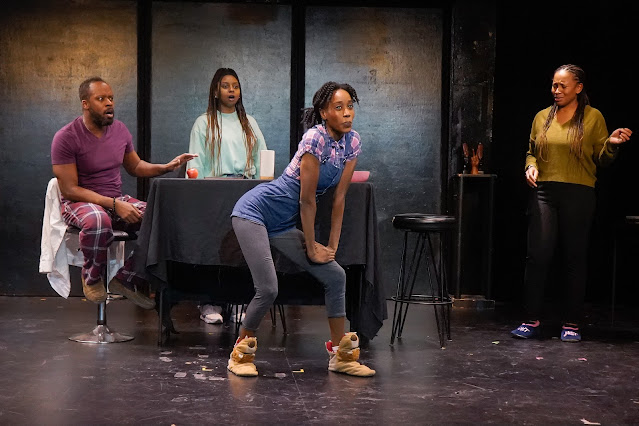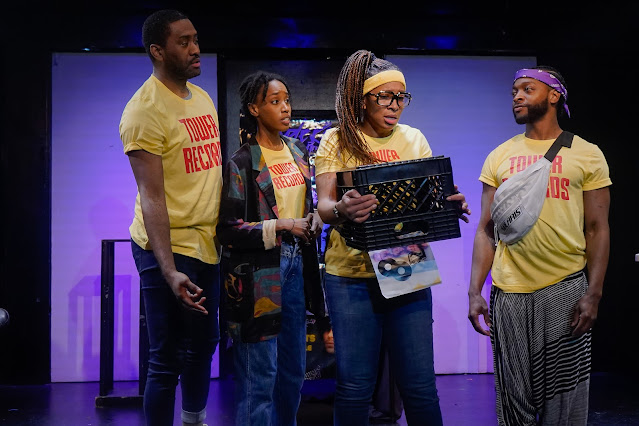In its 14th year, the annual The Fire This Time Festival continues to bolster its status as a must-see event on NYC's theatrical calendar. The Festival's program of ten-minute plays provides a showcase for early-career playwrights of African and African American descent, and this year's fantastic selections, under the accomplished direction of Goldie E. Patrick and realized by an outstanding cast, stand out even among the high-quality work of previous years. The Festival also features
, the first of short plays by The Fire This Time alum Julienne Hairston and the second of a full-length play by the festival's founder Kelley Girod, and all events offer both in-person and livestreaming options.
Andrea Frierson's
Houston takes us back to 1970 to begin the program, introducing us to touring husband-and-wife classical singers Alexander (Darell J. Hunt) and Shirley (Alana Raquel Bowers), who have just gotten off the bus in the wrong Houston. Potentially stranded overnight, the pair must deal not only with fending off local farm animals but also with their anxiety about being alone in a small Southern town, as well as the gap between the grand love which they embody on stage and their actual marriage. As wonderfully rendered by Hunt and Bowers, the couple's relationship is very funny at the same time as it feels lived-in and authentic.
 |
| Reginald L. Barnes and Broderick Clavery in Tuff. Photo by Danté Crichlow |
Up next,
Tuff, by Cris Eli Blak, largely eschews the humor of
Houston (and the rest of the program) even as it puts a similar emphasis on interpersonal support, here in the form of male friendship and father-son relationships. Kyle, nicknamed Coach (Reginald L. Barnes), is paid a visit by his frat brother Gary, or Goose (Broderick Clavery), who has left his keg-draining ways behind him and wants, to Coach's displeasure, to talk about the death of Coach's son a year ago. Through this painful, movingly portrayed exchange, the play tackles the imposition of normative masculinity and its relation to the perception of athletics as the avenue, especially for Black men, to what Kyle identifies as "the good life."
 |
| Monique A. Robinson and Malikha Mallette in Tower. Photo by Danté Crichlow |
The comedic
Tower, by kl, finds us in the 1980s, which we know because by-the-book Assistant Manager Tasha (Malikha Mallette) and her crew at a Middle-American branch of Tower Records–Percy (Monique A. Robinson), Zavier (Broderick Clavery), and Eddy (Darell J. Hunt)–are prepping their store to sell tickets for Prince's
Purple Rain tour. Unlike the colleagues whom she supervises, Tasha actually enjoys ticket-sale days. However, as the store's opening looms ever closer, Tasha's (white, male, frequently drunk) manager seems to be missing–and he has the tickets. Can Tasha take charge–and perhaps even keep it?
 |
| Alana Raquel Bowers and Malikha Mallette in Black Women in Tech. Photo by Danté Crichlow |
The corporate ladder also figures heavily in Zachariah Ezer's
Black Women in Tech, which sees Brooklynites "Kelly" (Malikha Mallette) and her significant other Penny (Alana Raquel Bowers) moving into a fully automated home in Indiana for one year as part of a pilot program run by Kelly's tech-firm employer. The women become trapped in a walk-in closet due to a, let's say, shortcoming in the house's sensors, and like the stranded couple in
Houston–and with a similar mix of engaging humor and relatable authenticity–their situation leads them to assess their relationship, including disparities in their worldviews, incomes, and approaches to identity (for example, Kelly, we learn, is her work name).
 |
| Reginald L. Barnes and Monique A. Robinson in For the Dark-Skinned Movie Going People of the World. Photo by Danté Crichlow |
From Big Tech, the hilarious and incisive
For the Dark-Skinned Movie Going People of the World, by Steve Harper, moves to Big Entertainment. Pop star Jasmine (Monique A. Robinson) wants to be in director Karl's (Reginald L. Barnes) new film, and she refuses to be deterred by the fact that he doesn't want to meet with her, much less cast her. Jasmine, whose Andrew Lincoln-esque pronunciation of Karl's name got big laughs every time, accuses Karl of being an elitist, while Karl believes that he has a responsibility to audiences and artists, and especially to Black audiences and artists, to cast actors who have dedicated themselves to studying their craft and have the credentials to prove it. Ultimately, Jasmine, along with the play, asks whether mutual elevation rather than gatekeeping should be their goal as Black artists.
 |
| Broderick Clavery and Darell J. Hunt in He's the First. Photo by Danté Crichlow |
A Black artist helps high school students Zach (Darell J. Hunt) and Ernest (Broderick Clavery) strike up a conversation in Phillip Gregory Burke's
He’s The First: Ernest, who is at the public library on a suspension, helps Zach check out Toni Morrison's
Jazz, leading the young men to discover a mutual love of the author. Via fantastically fluid dialogue and performances, Zach and Ernest explore topics such as their own identities (including how they intersect with gradations of class) and how those of artists are packaged and commodified, all in service of a winning, layered flirtation. In an echo perhaps of Zach and Ernest's feelings about one another, we are left wanting to spend more time with these characters (something that is overwhelmingly true across the program).
 |
| Reginald L. Barnes, Malikha Mallette, Monique A. Robinson, & Alana Raquel Bowers in #LakeishaJefferson. Photo by Danté Crichlow |
The students in
#LakeishaJefferson, written by Goldie E. Patrick and the final show in the program, are younger, but the issues of identity which they must navigate are no less significant. The titular Lakeisha Jefferson (Monique A. Robinson) is in second grade, and her homework is a presentation on what she wants to be when she grows up. Lakeisha, influenced by her older sister, Imani (Alana Raquel Bowers) teaching her a particular TikTok dance, has decided that she wants to be a hashtag, without understanding the full context of what that means. Her parents (Malikha Mallette and Reginald L. Barnes) must now guide her to that fuller understanding, culminating in an ending that is both heartbreaking and beautiful.
#LakeishaJefferson involves a coming together that can be seen as a throughline of this year's short plays, in which support or bonds are (re)affirmed, often in the face of personal or professional obstacles. Looked at as a whole, characters also often learn about themselves based on their past experiences while avoiding the sort of cliches that such a dynamic might suggest. Funny, insightful, and touching, the 14th season of The Fire This Time Festival delivers an exceptional, energizing evening of superbly performed short works.
-John R. Ziegler and Leah Richards











Comments
Post a Comment